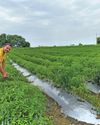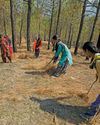
THE SOUTHWEST monsoon arrived three days ahead of its schedule on May 29 this year. Still, almost a month later, Ajit Pratap was eagerly waiting for the rains to reach his farm in the Jalaun district of Uttar Pradesh. "I have not been able to sow basmati on my 10-hectare (ha) and the forecast suggests the monsoon rains are not coming to my district before July," he says. By this time last year, the village had not only finished sowing but had also started transplanting paddy from the nursery to the farms.
Some 650 km away, Gulab Kapse of Madhya Pradesh's Betul district was forced to sow his soybean crop twice after 60 per cent of the seeds he had sown between June 9 and 10 failed to germinate. Agriculture in Temni village is totally rain-dependent. "Usually it rains in June, but this time the proper rains started almost a month later, after July 14," he says.
In Maharashtra's Nashik district, Bharat Dighole says farmers could not carry out sowing in his village, Jaygaon, in June. "For the last six-seven years that June is going to waste. We are just starting to sow. By now, nursery preparation should have been completed," he says. Dighole cultivates soybean, maize, cabbage and onion. In eastern India, Chhattisgarh, Odisha, Bihar, and Jharkhand have also reported delays in sowing this year because of a patchy monsoon.
June and July are the two most important kharif months, particularly for the 61 per cent of farmers who practice rainfed agriculture, as per National Rainfed Area Authority. A dry June means the ground moisture levels are not conducive for sowing, and the delay can cripple food production.
This story is from the {{IssueName}} edition of {{MagazineName}}.
Start your 7-day Magzter GOLD free trial to access thousands of curated premium stories, and 9,000+ magazines and newspapers.
Already a subscriber ? Sign In
This story is from the {{IssueName}} edition of {{MagazineName}}.
Start your 7-day Magzter GOLD free trial to access thousands of curated premium stories, and 9,000+ magazines and newspapers.
Already a subscriber? Sign In

THE CIRCULARITY ARGUMENT
A circular economy can help India achieve its developmental aspirations while following the low-carbon pathway. It will also help address the challenges of waste management, pollution and overexploitation of natural resources. Industries are already innovating to reuse high-volume wastes and have shown that the transition can usher in both environmental and financial windfalls

Banking on flawed drug voluntary licences
The Medicines Patent Pool is pushing for more VLs, but its bad deal with Novartis on a cancer drug shows the pitfalls

Lasting solutions
For the first time, the UN has recognised the role of indigenous communities in tackling aridity. A repository of traditional knowledge India has the wherewithal to lead the way

IMD at 150
India's journey into modern weather forecasting took a decisive turn 150 years ago with the establishment of India Meteorological Department during the British rule. The agency has come a long way since then, shaping the way the country predicts and responds to its diverse climate challenges

Every drop counts
In drought-prone Marathwada region, 14 villages have managed to counter water shortage by budgeting the resource

Threat to survival
Hollongapar Gibbon Sanctuary in Assam faces ecological challenges as railway electrification and hydrocarbon exploration endanger its fragile biodiversity

'Migration is going to be a battlefield'
AMITAV GHOSH is one of the foremost chroniclers of our times. His literary sojourn includes writings on topics that range from languages to climate change to human lives. His latest book, Wild Fictions, brings some of his works on these issues under one title. In a conversation with RAJAT GHAI, Ghosh shares his views on the future of human movement. Excerpts:

Face of future
California wildfires confirm forest fires are intensifying in a hotter world, emitting substantial amounts of greenhouse gases and reinforcing global warming

Friends of the forest
Residents of 30 villages in Uttarakhand establish a model for public participation in saving forests from wildfires

Climate-crazy playbook
Just hours after his second (and final) term began on January 20, US President Donald Trump unleashed 46 presidential actions. Several of these are centred on the US' climate commitments, energy transition, migration and trade policies, and are likely to have negative global implications